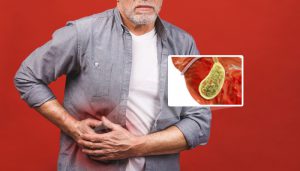This post is also available in:
Tiếng Việt (Vietnamese)

Know the basics
What is gallstones?
Gallstone is a condition that is caused when bile, a fluid made by your liver to digest fat, hardens. Your gallbladder, a pear-shaped organ under your liver, is where bile is stored. A gallstone usually forms if your gallbladder or bile ducts are blocked. Gallstones may vary in size. It can be as small as a grain of sand or as big as a golf ball. This can cause pain and lead to harmful effects to the body.
There are 2 types of gallstones. They include:
- Cholesterol gallstones. These appear yellow in color and are mainly made up of undigested cholesterol. This is the most common type.
- Pigment gallstones. These appear dark brown and black and are mainly made up of excess bilirubin.
How common is gallstones?
Gallstones are common. It most commonly affects older adults, women and people who are overweight. Women are easier to have gallstone due to the female hormone, estrogen. More cases have been found in Native Americans and Mexican Americans. It can be managed by reducing your risk factors. Please discuss with your doctor for further information.
Know the symptoms
What are the symptoms of gallstones?
Most cases of gallstones have no clear symptoms. However, when the gallstones are big enough, it can cause symptoms. The common signs and symptoms are:
- Sudden and intense pain in upper right abdomen;
- Sudden and intense pain in the center of your abdomen, below your breastbone;
- Back pain between your shoulder blades;
- Jaundice or yellow eyes;
- Fever;
- Clay-colored stools;
- Nausea and vomiting.
There may be some symptoms not listed above. If you have any concerns about a symptom, please consult your doctor.
When should I see my doctor?
You should contact your doctor or seek immediate medical attention, if you have any of the following:
- Painful and intense stomachache that prevents you to sit still;
- Jaundice or yellow eyes;
- High fevers or chills.
Know the causes
What causes gallstones?
The exact cause is unknown but doctors suggest there are factors that can influence. These factors are:
- Your gallbladder contains too much cholesterol. Usually, gallbladder has enough substance to dissolve cholesterol secreted from liver. But if liver eliminate more cholesterol than the gallbladder can digest, excess cholesterol may crystalize and become gallstones.
- Your bile contains too much bilirubin. Bilirubin is a substance formed when your body destroys red blood cells. Some diseases may make the liver produce too much bilirubin. These diseases may include cirrhosis and biliary infection. Excess bilirubin can cause gallstones.
- Your gallbladder doesn’t empty correctly. This causes the bile to become concentrated and harden, which forms gallstones.
Know the risk factors
What increases my risk for gallstones?
There are many risk factors for gallstones, such as:
- Being over 60 years old;
- Being overweight or obese;
- Being pregnant;
- Your diet is high-fat, high cholesterol and low fiber;
- You have family history of gallstones;
- You have health conditions such as diabetes, liver infection or cirrhosis;
- Taking drugs such as cholesterol-lowering drugs or drugs containing estrogen.
Understand the diagnosis & treatment
The information provided is not a substitute for any medical advice. ALWAYS consult with your doctor for more information.
How is gallstones diagnosed?
To determine a proper diagnosis, your doctor may perform the following tests:
- Medical history and physical exam.
- Abdominal ultrasound or computerized tomography (CT) scan to take pictures of your gallbladder.
- Tests to check your bile ducts. These tests include hepatobiliary iminodiacetic acid (HIDA), magnetic resonance imaging (MRI) or endoscopic retrograde cholangiopancreatography (ERCP).
How is gallstones treated?
Gallstones that do not cause symptoms may not need treatment but need close monitoring. If symptoms do appear, treatment options may include the following:
- Surgery. This may be recommended when gallstones keep reoccurring. When your gallbladder is removed, bile will flow directly from your liver to the small intestine.
- Drug therapy. There are medications that can dissolve your gallstones but can take a long period time. This is usually the best treatment when surgery is not an option.
Everyone’s condition is different. You should discuss with your doctor what the best treatment option is for you.
Read more post:
What are some lifestyle changes or home remedies that can help me manage gallstones?
The following lifestyles and home remedies might help you cope with gallstones: You can prevent gallstones if you maintain healthy weight. You should reduce fat, protein, but supplement fiber to reduce cholesterol.
Doing more exercises also help you to not only control your gallstones, but decrease risk of other heart and digestive problems.
If you have any questions, please consult with your doctor to better understand the best solution for you.
Sources:
- Ferri, Fred. Ferri’s Netter Patient Advisor. Philadelphia, PA: Saunders / Elsevier, 2012. Print edition. Page 965.
Porter, R. S., Kaplan, J. L., Homeier, B. P., & Albert, R. K. (2009). The Merck manual home health handbook. Whitehouse Station, NJ, Merck Research Laboratories. Print edition. Page 243.
- Gallstones. https://www.nlm.nih.gov/medlineplus/ency/article/000273.htm. Accessed July 14, 2016.
- Gallstones Definition. http://www.mayoclinic.org/diseases-conditions/gallstones/basics/definition/con-20020461. Accessed July 14, 2016.
- Review Date: January 4, 2017 | Last Modified: January 4, 2017

